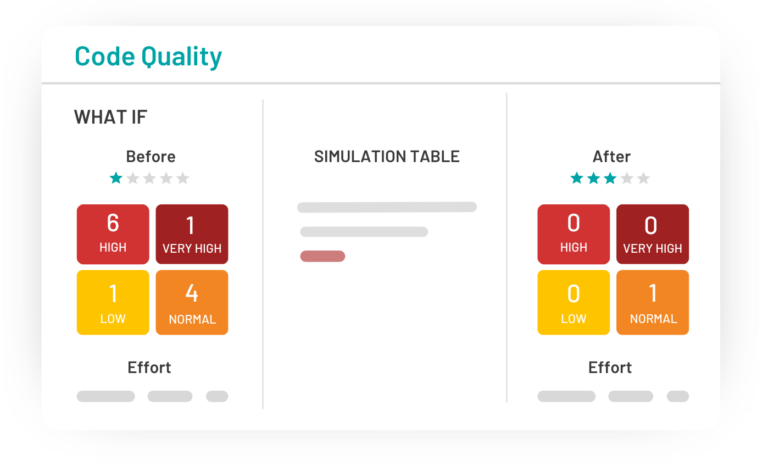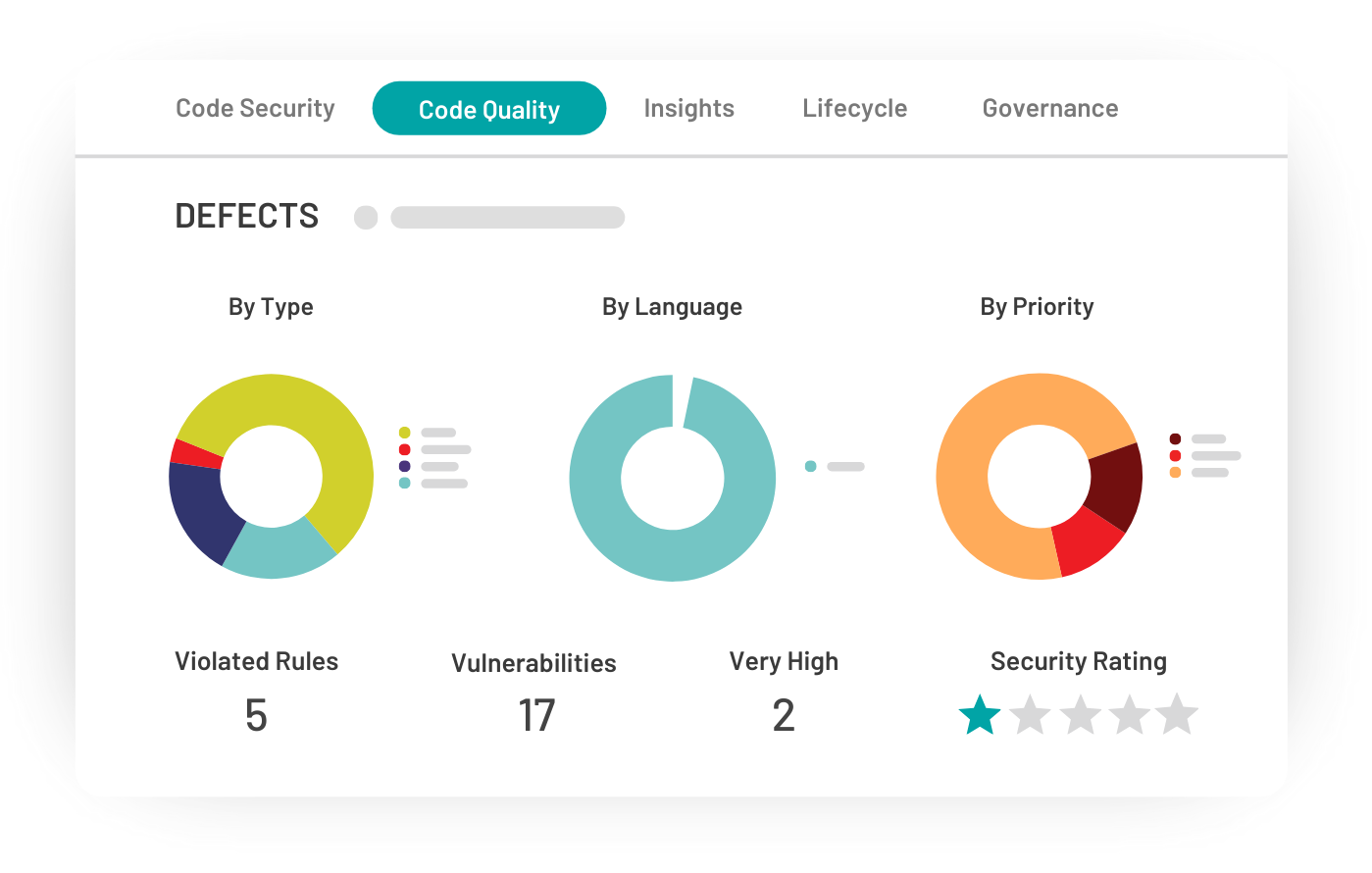
Code quality and software quality go far beyond not having any bugs—they mean having software that's reliable, maintainable, and secure. Using static code analysis allows you to update or eliminate obsolete code so your entire application runs better.
This also has implications regarding security flaws. By having unnecessary or obsolete code in your software, your application has a broader attack surface area that hackers can use to get where they don't belong. Improving your code quality reduces the surface area for them to use.

Bad actors and other attackers are constantly looking for vulnerabilities in open-source code. Taking a reactive approach to security can potentially put your users' information at risk, including SQL injection vulnerabilities, and leave you liable for millions of dollars in damages.
Static code analysis enables a proactive approach by identifying vulnerabilities early and staying up to date with open-source patches and best practices. This process protects not only your app and users but also your brand reputation by enabling secure software and reducing potential liabilities.
Nobody likes dealing with a slow or unresponsive app. Static code analysis gives you the tools you need to make your application more efficient.
Static code analysis is more than just a security checkpoint—it plays a vital role across various stages of the software development lifecycle. From improving developer workflows to supporting compliance and protecting production environments, here are some of the most impactful use cases.
Static code analysis empowers development teams to catch security risks early as the code is written. This “shift-left” approach helps reduce costly late-stage fixes and reinforces secure coding habits throughout the lifecycle and improves overall code quality.
By running static analysis on new code contributions, teams can help onboard developers faster. The tool acts as a built-in reviewer, flagging violations of coding rules and coding guidelines and surfacing best practices without requiring constant manual oversight.
Industries like finance, healthcare, and critical infrastructure must perform static code analysis to meet strict regulatory requirements. Static analysis helps enforce standards such as ISO 25000, OWASP, CWE, PCI DSS, HIPAA, and analysis rules by continuously checking for violations and generating audit-ready reports.
Legacy applications often contain technical debt and outdated logic. Static code analysis helps teams identify obsolete functions, security risks, and logical errors, streamlining modernization efforts and reducing future maintenance.
Static code analysis can be integrated into pull requests and merge pipelines for code review, preventing flawed or non-compliant code from entering the main branch. This reduces bugs in production and aligns teams around consistent quality and style expectations.
The initial phase of static code analysis is parsing your source code so the tool can correctly interpret your program's structure as it looks for potential issues. During this stage, the tool checks for syntax errors and prepares the code for deeper analysis.
Static code analysis tools use data flow analysis to trace the flow of data within the code. This helps developers detect issues relating to uninitialized variables, insecure data handling, logic errors, data dependencies, and potential runtime errors before they cause problems.
Static code analysis tools generate reports that outline detected vulnerabilities, code quality issues, and other findings. These reports prioritize issues by severity so your team can address the most critical risks first. Kiuwan streamlines this process with real-time alerts and actionable insights to help your team stay ahead of potential threats to your app's security and quality.

Modern development practices rely heavily on automation and speed, especially when integrating static analysis into your Continuous Integration/Continuous Deployment (CI/CD) pipeline. Static code analysis becomes even more powerful when integrated directly into your Continuous Integration/Continuous Deployment (CI/CD) pipeline. This ensures that code is automatically scanned for vulnerabilities, code smells, and deviations from coding guidelines every time it’s committed.
By embedding static analysis into CI workflows, teams can catch issues as they happen, prevent flawed code from being merged, and reduce the risk of regressions. This approach supports a culture of secure, reliable software engineering and eliminates the need for context-switching between development and testing environments. It also reinforces quality assurance by embedding checks throughout the software development lifecycle—not just at the end.
Kiuwan keeps your code in alignment with industry standards like OWASP, CWE, and ISO 25000 by identifying noncompliance issues so teams can maintain secure, high-quality codebases while meeting regulatory requirements.
Kiuwan cross-references global vulnerability databases against your code so you can always be sure your code meets the highest security standards across your development lifecycle. Kiuwan integrates across multiple CI/CD integrations, repositories, and version control systems and supports over 30 programming languages.
Kiuwan establishes threat models to understand how hackers can exploit your code and set up simulations of real-world attacks involving external systems. By analyzing threats earlier, including risks associated with user input, teams can implement proactive measures to mitigate risks and strengthen application security.
With Kiuwan, you get proactive, real-time insights that keep your codebase clean, compliant, and secure.
Start your free trial today and take charge of your software quality.
A static code analysis solution is an analysis tool that scans your source code without executing it, identifying potential issues related to code quality, security vulnerabilities, and deviations from best practices. It supports developers in writing more reliable software by highlighting issues early in the software development lifecycle.
Static code analysis integrates early in the development process, enabling teams to improve code quality, reduce bugs, and identify defects early, ultimately saving time and cost.
A static analyzer can detect a wide range of issues, including code quality and maintainability, security vulnerabilities, performance issues, and coding standards violations. It also uncovers hidden bugs that could arise from human error, insecure logic, duplicate code, or missing validations.
Yes. Leading static code analysis tools, like Kiuwan, support analysis across multiple programming languages. This ensures consistent enforcement of coding standards and security checks regardless of your technology stack or programming language preferences.
By enforcing coding guidelines, identifying risky patterns, and offering real-time feedback, static code analysis helps establish disciplined software engineering processes. It reinforces team-wide adherence to quality and security benchmarks, reducing long-term maintenance and technical debt.
Static code analysis proactively identifies security vulnerabilities such as SQL injection before they can be exploited in production. It can analyze large codebases and complex applications in multiple programming languages and enforce coding standards to ensure code quality
Static analysis evaluates source code without executing the application, unlike dynamic testing, which analyzes code during runtime. This enables early detection of bugs, security vulnerabilities, and coding standard violations—often before the code is even compiled. Because it catches issues early in the development cycle, static analysis is a cost-effective way to improve code quality and security across the SDLC.